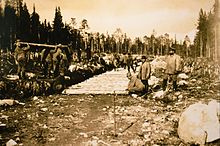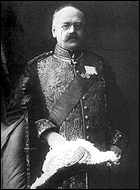Alexander Trepov
This article may need to be rewritten to comply with Wikipedia's quality standards. (April 2017) |
Alexander Trepov | |
|---|---|
Александр Трепов | |
Sergei Rukhlov | |
| Succeeded by | Eduard Kriger-Voinovsky |
| Personal details | |
| Born | 30 September 1862 Kiev, Kiev Governorate, Russian Empire |
| Died | 10 November 1928 (aged 66) Nice, France |
| Nationality | Russian |
| Parent |
|
| Alma mater | Page Corps |
Alexander Fyodorovich Trepov (Russian: Александр Фёдорович Трепов; Ukrainian: Олександр Федорович Трепов; 30 September 1862 – 10 November 1928) was the Prime Minister of the Russian Empire from 23 November 1916 until 9 January 1917. He was conservative, a monarchist, a member of the Russian Assembly, and an advocate of moderate reforms opposed to the influence of Grigori Rasputin.
Biography
Early life
Alexander was the youngest of the four sons of general
Alexander was educated in His Majesty's
Alexander was appointed as a member of the special commission to draft a plan for a
He was the brother of General

Trepov became senator in the
Prime Minister

On 8 November Boris Stürmer (pro-peace) was dismissed as prime minister/minister of foreign affairs, to the rejoicing of the Duma. On 9 November Empress
Trepov was a new, 'modern day
Trepov was supposed to achieve the resignation of four of the most unpopular ministers. On 16 November Trepov informed Alexander Protopopov that he wished him to give up his position in the Ministry of the Interior and take over that of Trade and Industry, but Protopopov refused. Trepov had made the dismissal of Protopopov an indispensable condition of his accepting the presidency of the council,[10] Protopopov being a 'protege of Rasputin'.[11] and supposedly having mental problems. On 19 November Trepov declared full transfer of the food issue at the request of the Duma to the ministry of agriculture.[1]
On 27 November both Protopopov and Alexandra travelled to Stavka. Trepov threatened to resign on the next day. On 29 November/12 December the German Chancellor, Theobald von Bethmann Hollweg, in a speech in the Reichstag, offered to open negotiations with the Entente in a neutral country. On 2 December, on his appearance in the Imperial Duma, Trepov revealed France and Britain promised Russia Constantinople and the Bosporus,[12] but was loudly hissed at by the Socialists.[13] The deputies shouted "down with the Ministers! Down with Protopopov!".[14] Pokrovsky said that Russia would never sign a peace treaty with the Central Powers, which caused a storm of applause. On 7 December the cabinet demanded that Protopopov should go to the emperor and resign, but at the request of the Tsar, his wife, Anna Vyrubova and Rasputin combined[citation needed] the pro-peace Protopopov stayed in his job.[10]
Rasputin
Trepov having failed to eliminate Protopopov tried to bribe Rasputin.
Post-Premier
On 16 December 1916 the
In the seventeen months of the `Tsarina's rule', from September 1915 to February 1917, Russia had four
Ministers of Transport and four Ministers of Agriculture. This "ministerial leapfrog", as it came to be known, not only removed competent men from power, but also disorganized the work of government since no one remained long enough in office to master their responsibilities.[20]
According to Bernard Pares Trepov was probably appointed as a curator at the Tsarskoye Selo Lyceum, where he met the tsar on February 1, 1917.[citation needed]
After the October Revolution he was arrested by the Cheka. Trepov collaborated with Count Paul von Benckendorff to protect the imperial family. From autumn 1918 to January 1919 he led in Helsinki the "Special Committee for Russian in Finland". In the 1920s Trepov emigrated to France, from where he supported the White Army. He became president of the "Union des Organisations monarchiques russes". In 1921 he and his brother-in-law Alexander Mosolov participated in the "Congrès monarchiste russe", organized in Bad Reichenhall.
He died in 1928 and was buried at the Russian Orthodox Cemetery, Nice.
References
- ^ a b c d The PENULTIMATE PRIME Minister of the RUSSIAN EMPIRE A. F. TREPOV by FEDOR ALEKSANDROVICH GAIDA (2012)
- ^ "Features And Figures Of The Past Covernment And Opinion In The Reign Of Nicholas II".
- ISBN 978-0-297-85266-7.
- ^ "Full text of "The memoirs of Count Witte"".
- ^ Seeger, p. ?
- ^ Pares, p. 299; Radzinsky, p. 353.
- ISBN 978-0-297-85266-7.
- ^ a b c d Figes, p. 288
- ^ "Ведомства иностранных дел России/СССР и их руководители".
- ^ a b c Pipes, p. 261
- ^ Figes, p. 286
- ISBN 9781847658593– via Google Books.
- ^ Pares, p. 396; Spargo, p. 97.
- ^ "Maurice Paléologue. An Ambassador's Memoirs. 1925. Vol. III, Chapter IV".
- ^ Massie, p. ?
- ^ Mosolov, p. ?
- ^ Pares, p. 395; Radzinsky, p. 433
- ^ a b "The tsarina's letters exerting political influence (1915-16)". 10 December 2012.
- ^ Walsh, p. 115, 116 & 297
- ^ Figes, p. 278
Bibliography
- Figes, Orlando (2014). A People's Tragedy: The Russian Revolution 1891–1924. London: The Bodley Head. ISBN 9781847922915.
- The PENULTIMATE PRIME Minister of the RUSSIAN EMPIRE A. F. TREPOV by FEDOR ALEKSANDROVICH GAIDA (2012)
- Gurko, Vladimir I. (1939). Features And Figures Of The Past Covernment And Opinion In The Reign Of Nicholas II. New York: Russell & Russell.
- Massie, Robert K. (2013). Nicholas and Alexandra: The Tragic, Compelling Story of the Last Tsar and his Family. Head of Zeus. ISBN 9781781850565. Retrieved 27 August 2016.
- Mosolov, Aleksandr (1935). At the court of the last tsar: being the memoirs of A. A. Mossolov, head of the court chancellery, 1900-1916. Methuen. Retrieved 19 June 2014.
- Pares, Bernard. The Fall of the Russian Monarchy
- Pipes, Richard (1991). The Russian Revolution. New York: Vintage Books. ISBN 9780307788573. Retrieved 27 August 2016.
- Radzinsky, Edvard (2010). The Rasputin File. Knopf Doubleday Publishing Group.
- Seeger, Charles Louis (1921). Recollections Of A Foreign Minister. Doubleday Page & Company.
- Spargo, John (1919). Bolshevism: The Enemy of Political and Industrial Democracy. Elamedia Group LLC. ISBN 9781449550752.
- Walsh S.J., Edmund A. (2009). The Fall of the Russian Empire: The Story of the Last of the Romanovs and the Coming of the Bolshevik. Wildside Press LLC.
Other
- An obituary can be found in The Times, Monday, Nov 12, 1928; p. 18 (using the old transliteration Trepoff).
External links
![]() Media related to Alexander Trepov at Wikimedia Commons
Media related to Alexander Trepov at Wikimedia Commons
